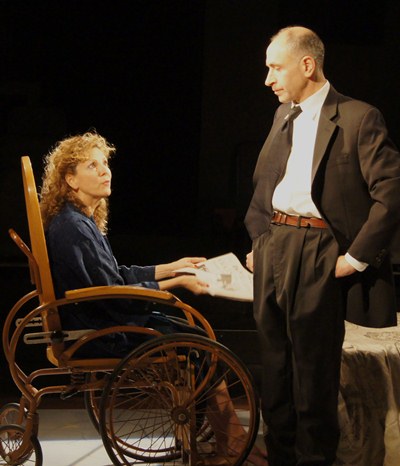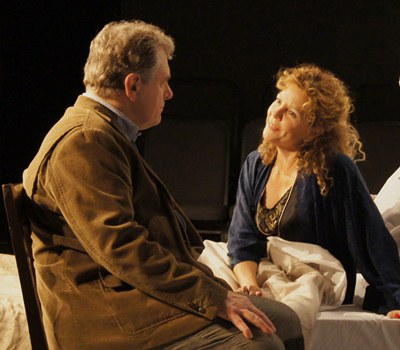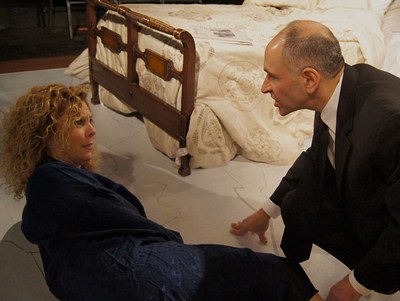Role Playing: In wheelchair, Jacqueline Grandt explores paralysis of neglect in ‘Broken Glass’
 Interview: Reprising role she played at Redtwist Theatre in 2004, Grandt says Arthur Miller’s story of a Brooklyn Jewish couple’s loveless marriage, set at the time of Kristallnacht, reaches tragic depths.
Interview: Reprising role she played at Redtwist Theatre in 2004, Grandt says Arthur Miller’s story of a Brooklyn Jewish couple’s loveless marriage, set at the time of Kristallnacht, reaches tragic depths.
By Lawrence B. Johnson
Except when she crashes to the floor, Jacqueline Grandt spends the full length of Arthur Miller’s “Broken Glass” at Redtwist Theatre in a wheelchair or resting in bed. Yet every night, Grandt says, she leaves the theater physically exhausted.
“People sometimes ask me, ‘What’s so tiring?’ says the veteran actor, “and I tell them, ‘You have no idea.’”
 Sitting or recumbent, Grandt endures a nightly emotional grinder as Sylvia Gellburg, whose husband Phillip (Neal Grofman), a real estate broker, has lost sight of her and their marriage in his growing paranoia at being a Jew in a world he believes is stacked against him.
Sitting or recumbent, Grandt endures a nightly emotional grinder as Sylvia Gellburg, whose husband Phillip (Neal Grofman), a real estate broker, has lost sight of her and their marriage in his growing paranoia at being a Jew in a world he believes is stacked against him.
When we meet this Brooklyn couple, in late 1938, Sylvia – healthy, fortyish and beautiful — has recently and inexplicably lost the use of her legs. Phillip consults a doctor, who quickly suspects a connection between Sylvia’s paralysis and Phillip’s leaking bitterness.
But Phillip sees a different link: His wife has become obsessed with newspaper reports about the sudden rise in violence against Jews in Germany and Austria, starting with the massive vandalism of synagogues, businesses and homes that came to be known for its wholesale shattering of windows as as Kristallnacht.
“I think Sylvia understands Phillip’s plight and that she believes his job has become the only thing in his life he truly cares about,” says Grandt,” who also played opposite Grofman when Redtwist staged “Broken Glass” in 2004. “She sees him trying not to be Jewish, which is devastating and sad. But I don’t think she necessarily sees what’s coming, his complete meltdown.”
 One might be inclined to say that Sylvia has already melted down, analyze the cause however you will. Yet Grandt views the woman’s paralysis not as crash but rather as a liberating flight.
One might be inclined to say that Sylvia has already melted down, analyze the cause however you will. Yet Grandt views the woman’s paralysis not as crash but rather as a liberating flight.
“When I did research into hysterical paralysis, I found an interesting argument that such an event can represent something the mind has finally accomplished. Sylvia’s living a life that’s incomplete, partly in the sense of her sexual relationship with her husband, who hasn’t touched her for many years.
“When she reads the newspapers and sees all these terrible things happening to the Jews, she feels desperation because she’s completely unable to help – to accomplish anything she feels is important. But then she achieves hysterical paralysis, in effect shutting down her body and freeing her mind.”
Sylvia is indeed now spared any semblance of physical contact with Phillip. But the game takes another convoluted turn when the robust doctor (played by Michael Colucci, who also co-directed with his wife Jan Ellen Graves) comes calling, and Sylvia grooves on his bedside manner.
 “Her relationship with the doctor is difficult, really complicated,” says Grandt. “Sylvia’s not a person who would actively deceive her husband, but she needs so deeply to be loved. Then in walks this doctor who’s such a warm character. For Sylvia, it’s automatic. She clings to him – his arm, his hand, anything to make physical contact.
“Her relationship with the doctor is difficult, really complicated,” says Grandt. “Sylvia’s not a person who would actively deceive her husband, but she needs so deeply to be loved. Then in walks this doctor who’s such a warm character. For Sylvia, it’s automatic. She clings to him – his arm, his hand, anything to make physical contact.
“Whether it’s sexual or not, she just needs this honest, physical caring. It’s such a tragedy. No matter how many times we do this play, Neal and I walk off the stage saying to each other, ‘This is so tragic.’ Even though the doctor helps Phillip to understand that Sylvia needs his love, that he needs to repair what has happened between them, there’s really nothing Phillip can do. That time has passed.”
While Grandt sees Sylvia as the stronger personality in the marriage, she also says that sort of toughness on the outside can belie great vulnerability beneath the surface. And Phillip is so caught up in his personal torment that he has ceased to sense his wife’s pain.
“Neal and I talked about the reality of what’s going on with Phillip, that he suffers from his own emotional paralysis,” says Grandt. “He sees the Jews as alienated from the rest of the world. He’s so focused on the difficulty of being a Jew that it’s hard for him to be anything. But Phillip doesn’t understand any of this, what it has done to him. He doesn’t take responsibility, but blames everyone around him – including Sylvia – for his unhappiness.”
Grandt says the company’s interpretation has undergone a substantial metamorphosis since Redtwist last produced “Broken Glass” in 2004.
“We’re all eight years older, for one thing. You have eight more years of living under your belt. And the first time we did it, we were into the less-is-more approach to theater. But when we came to it this time, we all agreed we were really going to put it out there. The emotions are so raw, and we were going to allow ourselves to be raw and not keep anything in.
“Many people look at ‘Broken Glass’ as almost a melodrama because of its intensity. I’m not one of those people. These scenes of breakdown that Miller has created for Phillip and Sylvia are so real. It’s not melodrama. It’s your life, and your life is disintegrating in front of you.”
Related Links:
- Deep cuts leave souls bleeding in Redtwist’s ‘Broken Glass’: Read the review at ChicagoOntheAisle.com
- Performance location, dates and times: Details at TheatreinChicago.com
- Detailed preview of Redtwist Theatre’s 2012-13 season: Read it at ChicagoOntheAisle.com
- James Ridge thrives in cold skin of Shakespeare’s smiling serpent, Richard III
- Stephen Ouimette brews an Irish tippler with a glassful of illusions in ‘Iceman’
- Ian Barford revels in the wiliness of an ambivalent rebel in Doctorow’s ‘March’
- Chuck Spencer flashes a badge of moral courage in Arthur Miller’s ‘The Price’
- Rebecca Finnegan finds lyrical heart of a lonely woman in ‘A Catered Affair’
- Bill Norris pulled the seedy bum in ‘The Caretaker” from a place within himself
- Diane D’Aquila creates a twice regal portrait as lover and monarch in ‘Elizabeth Rex’
- Dean Evans, in clown costume, enters the darkness of ‘Burning Bluebeard’
- Dan Waller wields a personal brush as uneasy genius of ‘Pitmen Painters’
- City boy Michael Stegall ropes wild cowboy in Raven Theatre’s “Bus Stop”
- Brent Barrett is glad he joined ‘Follies’ as that womanizing, empty cad Ben
- Sadieh Rifai zips among seven characters in one-woman “Amish Project”
- Kirsten Fitzgerald inhabits sorrow, surfs the laughs in “Clybourne Park”
- Janet Ulrich Brooks portrays a Russian arms negotiator in “A Walk in the Woods
Captions and credits: Home page and top: Actor Jacqueline Grandt. Descending: Sylvia (Jacqueline Grandt) and Phillip (Neal Grofman) have little left to share. The doctor (Michael Colucci) offers comfort to Sylvia (Jacqueline Grandt). Even an attempt by Phillip (Neal Grofman) to reach Sylvia (Jacqueline Grandt) ends badly. (Photos by Jan Ellen Graves)
Tags: "Broken Glass", Arthur Miller, Jacqueline Grandt, Jan Ellen Graves, Michael Colucci, Neal Grofman, Redtwist Theatre


No Comment »
7 Pingbacks »
[…] In wheelchair, Jacqueline Grandt explores paralysis of neglect in ‘Broken Glass’ […]
[…] In wheelchair, Jacqueline Grandt explores paralysis of neglect in ‘Broken Glass’ […]
[…] In wheelchair, Jacqueline Grandt explores paralysis of neglect in ‘Broken Glass’ […]
[…] In wheelchair, Jacqueline Grandt explores paralysis of neglect in ‘Broken Glass’ […]
[…] In wheelchair, Jacqueline Grandt explores paralysis of neglect in ‘Broken Glass’ […]
[…] In wheelchair, Jacqueline Grandt explores paralysis of neglect in ‘Broken Glass’ […]